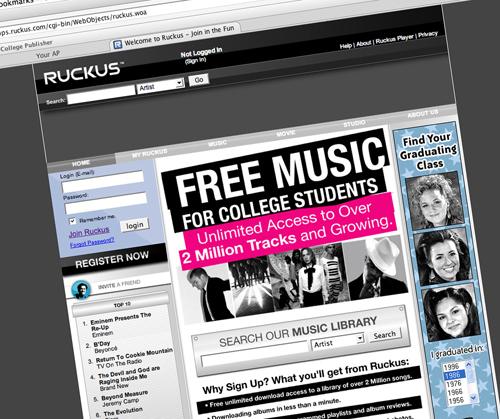College students download music from The Ruckus Network for free

Photo Courtesy of http://wapps.ruckus.com/
Jan 30, 2007
Last updated on May 12, 2016 at 07:26 a.m.
On Jan. 22, The Ruckus Network began providing a legal way for college students with a valid “.edu” e-mail address to access a music library with over 2.1 million songs, and download them free of charge.
Chris Lawson, the director of corporate development for Ruckus, said that they have been around for three years. In its early stages, Ruckus was a project undertaken by two Massachusetts Institute of Technology students who began to license music to college students.
“The initial purpose was to help give students, who are the most engaged and eager consumers of electronic media, access (to) the same kind of files in a legal way,” Lawson said.
Ruckus was initially a paid subscription service, which colleges paid for the accessibility to music and videos on behalf of the students. Ruckus was partnered with approximately 100 colleges, paying $3 a month for their students to access the library, with the ability to obtain a solid broadband connection through the Ruckus service. Now, the service runs off of advertising revenue.
Get The Daily Illini in your inbox!
As for the University, students are welcome to register for a Ruckus account by simply entering the site at www.ruckus.com and clicking “Join Ruckus.”
“College students consume music more than other demographics. It’s the most natural fit,” Lawson said. “When students are given the opportunity of a free and legit system, they usually do choose Ruckus. It’s safer and a lot easier to use.”
BluePoint Venture Marketing is a marketing firm currently representing the Ruckus Network. Andrew Soucy, the associate of BluePoint Venture Marketing, said record labels actually do not lose money for enabling college students to download free music.
All major labels, and an extensive list of independent labels including Universal, Warner Brothers and Arts & Crafts Records, have been signed. Record labels have agreed and accepted the Ruckus service. They hope a user might end up buying a specific CD after listening to the music, and as a way to cut down piracy.
However, Ruckus, a Windows-based service, has been receiving complaints about its compatibility with Mac computers. Only newer Mac computers with an Intel processor will be able to run Ruckus. With older Macs, users must purchase Windows emulator software to run the service.
Mac user, Sam Pridgeon, a freshman in LAS, is not likely to use Ruckus for downloading music.
“I think that if I wanted to use a program, it should work on my computer so that I wouldn’t need to download additional software,” he said. “It kind of turns me away from it.”
Also, downloaded Ruckus music cannot be uploaded onto iPods and select MP3 players.
“We would love Ruckus music to be compatible with iPod and iTunes,” Lawson said. “But the iPod won’t actually allow Ruckus to be put on it.”
Ruckus music is protected by the Windows Digital Rights Management format, forbidding anyone to upload music on MP3 players. But, with the purchase of “Ruckus-2-Go,” a music service that costs $3.99 a month, users are able to upload unlimited Ruckus music onto select MP3 players.
“A lot of Ruckus users use iPods and are really into iTunes, but they’ll use Ruckus as a way to discover new music or listen to a new CD,” Soucy said. “It can be seen as a complement to iTunes.”
Jordan Whicker, freshman in LAS, is a Windows user who still supports Ruckus, despite not being able to use the music on his iPod.
“I use my laptop for music when I’m at home,” he said. “So it would be easy.”
Not all hope is lost for those who own iPods, though. Music tracks can be purchased, ranging from 79 cents to 99 cents, and will be able to run on all MP3 players and burned onto CDs.
The next step for Ruckus is a new and improved video service with television and movie selections greatly expanded. For now, university students nationwide can enjoy free music from their computers in a safe, legal and virus-free manner.
“New music is released every Tuesday. There are 2.1 million songs. It’s basically every song you’d need or want,” Soucy said. “It has something for everyone.”





